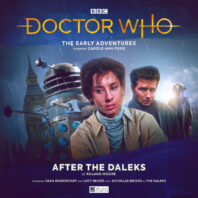
Released August 2021
SOME SPOILERS FOLLOW
‘The Dalek Invasion of Earth’ is unquestionably one of the most iconic and enduring serials of classic Doctor Who, the themes of how individuals can change for better or for worse against the oppressive backdrop of an insurmountable foe’s advances helping to create a dynamic yet horrifying world where hope just barely maintains a foothold and that would become the scene of one of the most profound departures from the TARDIS in the franchise’s history. And while Big Finish has explored Susan’s life on Earth following these televised events to some extent before, the immediate aftermath of this epic saga has largely remained untouched to this point, a gap that writer Roland Moore looks to fill in with the aptly-titled ‘After the Daleks.’
Fittingly, Susan who was so instrumental in the reclamation of Earth finds herself squarely in the middle of conversations about what the best trajectory for the ensuing rebuild should be. Such a monumental undertaking bolstered by a burgeoning sense of freedom and memory of what had occurred both during and before the Dalek invasion naturally brings with it an immense potential for very human drama and conflict with hope in its myriad forms at the core. Unfortunately, rather than delving into the true turmoil and hardships of a society coming back from the brink of utter destruction, a discussion about potential leadership options quickly leads to a fairly generic plot of a man looking for power simply for the sake of power. Marcus certainly has an intriguing enough backstory given his actions during the invasion and what he was ultimately responsible for, but while there is an intriguing metaphor in place about how he is taking after the Daleks as his decisions and actions belie his intentions, there simply isn’t enough nuance to this character to make him anything more than a stereotypical foil for Susan and the implicit knowledge and honour she holds.
Indeed, ‘After the Daleks’ feels like a story brimming with several intriguing ideas that don’t quite get fully explored. The tragedy of the Robomen and what that conversion does to an individual and family has never properly been explored, and the Chaplin family as fronted by Lucy Briers who takes over as Jenny in the role her mother made famous on screen presents ample opportunity to truly explore the psychological trauma that this aspect of the invasion caused. She never gives up on her roboticized brother Victor and attempting to reintegrate him into her life which is a true testament to the character, but when a means of reversing the process is remarkably discovered, little is done to explore the horrific ramifications of the Daleks’ acts on the individual other than to casually mention that Victor initially has lengthy periods of time and actions that he cannot remember. The substance in questions does at least present the prospect of a much more psychological warfare from the Daleks, but it’s an idea that holds a wealth of potential waiting to be much more fully explored.
The Daleks feature fairly minimally in ‘After the Daleks,’ but they are used to maximal effect during each appearance and certainly provide an added thrust to the narrative that features a pace that at times slows down quite considerably. Nonetheless, the overall tone captures the spirit of 1960s Doctor Who perfectly, and Carole Ann Ford is a marvelous narrator and provides a strong performance as a young Susan who is firmly coming to terms with her new reality away from her friends. Susan’s burgeoning confidence is written and acted incredibly well throughout, and though her scenes with David Campbell do perhaps rely on the established nature of where their relationship is headed a bit too much, the chemistry between Ford and Sean Biggerstaff is undeniable and culminates with a truly superb closing scene in which Susan steadfastly chooses her own path without her grandfather’s involvement. No matter what else is going on, this is very much a story about Susan’s continued personal growth in the most trying of circumstances, and in that respect it is an undeniable success.
‘After the Daleks’ is a story brimming with genuinely engaging ideas, and any return to the true First Doctor era is certainly welcome, but its focus follows an unremarkable path that only lightly touches upon the true psychological terror of his world and the new turmoil within it. The performances and direction are all superb, but it’s not hard to imagine a much deeper and more satisfying tale that a few changes could have yielded.
- Release Date: 8/2021


Leave a Reply